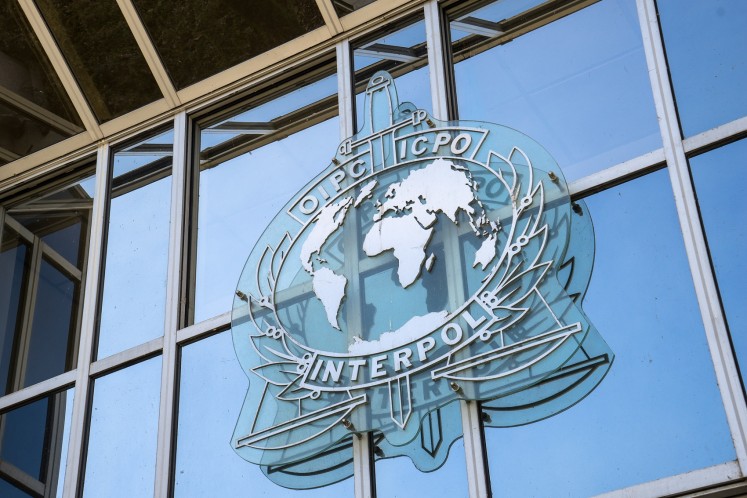Popular Reads
Top Results
Can't find what you're looking for?
View all search resultsPopular Reads
Top Results
Can't find what you're looking for?
View all search resultsIdentity politics is us, Ummah Party leader says
The remark came amid fears that the upcoming election will again polarize the country the way it did in the previous two elections, in which pro-Islamic sentiment, the religion professed by most Indonesians, was used to mobilize voters.
Change text size
Gift Premium Articles
to Anyone
 Sea of people: Participants in the so-called reunion of the 212 alumni pack the National Monument (Monas) in Central Jakarta in this file photo. The gathering was named after the massive rally held on Dec. 2, 2016, that called for the prosecution of then-Jakarta governor Basuki “Ahok” Tjahaja Purnama for blasphemy. (Antara/Sigid Kurniawan)
Sea of people: Participants in the so-called reunion of the 212 alumni pack the National Monument (Monas) in Central Jakarta in this file photo. The gathering was named after the massive rally held on Dec. 2, 2016, that called for the prosecution of then-Jakarta governor Basuki “Ahok” Tjahaja Purnama for blasphemy. (Antara/Sigid Kurniawan)
T
he Ummah Party has said that it will use identity politics as an electoral strategy in the 2024 general elections, cementing its brand as a populist Islamic party in the country with the world’s largest Muslim population.
The new Islamic party has passed the verification process at the General Elections Commission (KPU) and will thus join the other 23 parties, including two other Islamic parties, that will participate in the upcoming elections.
“We will say it out loud, ‘yes, we are the Ummah Party, and we are [the manifestation of] identity politics,’” party chairman Ridho Rahmadi said in a speech he delivered on the sidelines of the party’s national meeting on Monday, as quoted by republika.co.id.
The remark came amid fears that the upcoming election will again polarize the country the way it did in the previous two elections, in which pro-Islamic sentiment, the religion professed by most Indonesians, was used to mobilize voters.
Ridho, the youngest son-in-law of party founder and Reform era icon Amien Rais, however, argued that people had a misguided conception of identity politics, saying that politics would in fact have no purpose without “religious morality”.
“Politics will lose direction and be caught in moral relativism and situational ethics. This is the big project of secularism, which aims to separate religion from the fabric of life, including politics,” said the young politician, who earned his master’s degree in artificial intelligence from the Johannes Kepler University in Austria and doctoral degree in data science and machine learning from Radboud University in the Netherland.
Identity politics, he further said, is a political platform that is compatible with the state ideology of Pancasila, which contains both religious and secular values. “It needs to be understood that identity politics is Pancasila-ist politics,” he said.
Mosque politics
The party said that it would build its voter base from the mosques, defying calls from some religious leaders that politics should stay out of places of worship.
It believes that mosques could serve as a marketplace of ideas, including political ideas. “What needs to be banned is not the politics of ideas but the politics of incitement. The two are totally different,” Ridho said.
Sectarianism has been a staple in Indonesian politics for decades, but it has become more pronounced in recent years, culminating in the highly divisive 2017 Jakarta gubernatorial election that pitted a Muslim contender against a Christian incumbent.
In 2018, a year before the last presidential election, widely spread footage of a Muslim preacher telling his audience at a mosque in Surakarta, Central Java, that voting for President Joko “Jokowi” Widodo was haram, sparked concern about political sermons at houses of worship ahead of the 2019 election.
In the video, the preacher made a case against voting for Jokowi, who he said had failed as president, telling the people attending his sermon that they could leave the mosque if they supported the incumbent. The sermon, titled “Indonesia Bangkit dari Masjid” (Indonesia Rising from the Mosque), was delivered at the Jami MUI mosque.
The incident led to the issuance of a circular from the Religious Affairs Ministry on the need to screen preachers through a certification system. Critics, however, have questioned whether such a policy is democratic or could be effectively enforced.
“For Muslims, other than being a place of worship, mosques should become a place to incubate and showcase ideas, a melting pot for ideas to devise plans and strategy for the ummah [Muslim community] a starting point for a struggle, including a political jihad,” Ridho said. (ahw)










